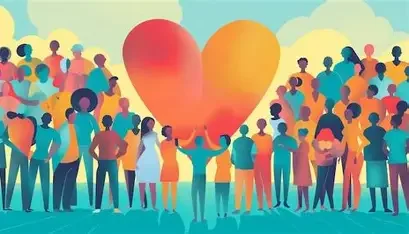God
Relationship to Self:
We celebrate our Unique Self
Each of us is a one-of-a-kind creation, lovingly formed with purpose and intention. Our journey begins by recognizing that we are not here by accident—our lives are meant to reflect the beauty and creativity of our Creator. As Scripture affirms in Psalm 139:14, “I praise you because I am fearfully and wonderfully made; your works are wonderful, I know that full well.” This truth invites us to honor the sacredness of our existence and celebrate the individual calling woven into our being.
The Beauty and Complexity of the Body
The human body is truly a masterpiece. Every system—whether under our conscious control or operating automatically—relies on simple elements like oxygen and nutrients to sustain life. Consider the harmony with which our heart beats, our lungs breathe, and our mind thinks, often without us realizing it. When we pause to marvel at how each cell and organ works together, we gain a deeper appreciation for the intricate design that supports us each day. The more we explore and understand our inner workings, the more we can celebrate the uniqueness with which we have been made.
Mindful Meditation and Spiritual Rest
To fully appreciate our bodies and souls, it’s powerful to engage in mindful meditation—quiet moments spent reflecting on the miracle of our design and the wisdom of God. Set aside time to meditate on your breath, thank God for the functioning of each system, and let Psalm 139:14 be an affirmation of your worth. These practices offer spiritual rest, inviting gratitude and peace into your heart. By meditating on God’s word and the wonders of your body, you nurture a deeper sense of appreciation and connection to your Creator.
Seeking Healing and Growth
Growth begins with honest reflection. Ask yourself: Do I desire healing in my mind, body, or spirit? What beliefs or obstacles are holding me back? Scripture encourages us to seek transformation and restoration: “You were running a good race. Who cut in on you to keep you from obeying the truth?” (Galatians 5:7). By bringing our hurts and hopes before God, we open ourselves to His loving guidance. Healing is possible when we surrender our struggles and trust in the One who designed us for wholeness.
What we believe drives us
Our personal growth is influenced by our feelings, reasoning, and choices. While emotions such as fear and anxiety often steer our actions, God provides us with something far more powerful: “For God has not given us the spirit of fear, but of power, love, and a sound mind.” (2 Timothy 1:7) The convictions we hold in our hearts shape the way we speak and act, ultimately guiding our futures. Each thought we have triggers chemical changes in our brains, creating pathways that are further reinforced by our interactions and relationships.
To heal from emotional wounds, we must first identify and reflect on the barriers or false beliefs that keep us from living with purpose. These obstacles might include distrust, disbelief, doubt, fear, unwillingness, pride, anxiety, lack of forgiveness, envy, feelings of rejection, jealousy, feeling unloved, shame, harsh judgment, guilt, or helplessness.
If we cling to falsehoods and fail to confront them, they can form negative patterns in our minds that react to experiences throughout life. It’s important to recognize that events from our earliest years, as well as those from adolescence or adulthood, may have shaped who we are today. True transformation comes when we allow our thoughts, guided by the Spirit, to become more influential than the thoughts driven by our human nature. By embracing positive thinking and seeking out encouraging and supportive environments, we strengthen healthy habits. Developing self-awareness enables us to break away from harmful cycles and move toward personal and spiritual growth.
Romans 12: 2 Be transformed by the renewing of your mind….then you will be able to test and approve what God’s will is.
Defining who you are
Our true identity is not found in outward appearances, achievements, or past pain. We ae not defined by others or by our mistakes. Instead, we are defined by the love and grace of God. Genesis 1:27 tells us we are humans created in the image of God. We are human beings, created to flourish, to strive for our best selves, and to live from a place of belovedness and wholeness. I often ponder that although we define ourselves by our differences an alien from outer space sees the sameness- the human species. That is how God sees us all as created beings. Noone more special or exalted than the other. Our worth is rooted in divine purpose, not the shifting standards of the world. When we embrace this truth, we find freedom to live authentically and courageously.
Our genuine identity is not shaped by how we look, what we've accomplished, or the pain we've endured. We are not measured by other people's opinions or by our past failures. Rather, our identity is established through God's love and grace. According to Genesis 1:27, we are made in God's image—human beings meant to grow, pursue our highest potential, and live with a sense of being cherished and whole. Sometimes, I reflect on how we tend to highlight our differences, yet if an outsider from space were to observe us, they'd simply see members of the same human race. This is how God views us: as His creations, with no one being more important or elevated than another. Our value stems from a divine purpose, not from the changing expectations of society. When we accept this truth, we are liberated to live with authenticity and bravery.
Relationships with Others:
Embracing Our Shared Humanity
Every person is more alike than different, united by a common humanity. We are more alike than different. As a physician, I’ve come to value how much we share in common beneath the surface. The layout of our organs is remarkably consistent from person to person, and our major body systems—like the circulatory, nervous, respiratory, and immune systems—function in similar ways for all of us. We process food and expel waste in the same manner, our cells possess nearly identical structures, and we all depend on the same essential nutrients to keep our bodies operating smoothly. We inhale and exhale the same gases, highlighting just how alike we truly are. The more I reflect, the more I recognize the countless ways our physical makeup unites us.
What makes us different mainly come from our perceptions about God, other people’s opinions about us and how we view ourselves. Recognizing this shared foundation helps us approach relationships with empathy and openness. The way we perceive God and ourselves forms the basis of how we interact with others; when we value ourselves and understand God's love, we are better equipped to care for those around us.
The Role of Unconditional Love
Loving others unconditionally is a cornerstone of faith-based relationships. While human love often comes with conditions, God calls us to a higher standard—one that requires His help and grace. When we view God positively and appreciate our own worth, we are empowered to love others in ways that goes beyond our natural limitations.
Mark 12:30-31 Love the Lord your God with all your heart and with all your soul and with all your mind and with all your strength. ‘The second is this: ‘Love your neighbor as yourself.’ There is no commandment greater than these
Benefits of Healthy Relationships
Healthy relationships do more than just make us feel good; they nurture our minds and bodies, and strengthen our communities. Positive connections foster trust, empathy, forgiveness, and emotional resilience. These qualities not only support individual well-being but also create environments where people can thrive together.
The Power of Intentional Relationships
Building healthy relationships is an ongoing journey that enriches our lives and communities. By embracing our shared humanity, loving others as God intends, and applying practical tools and skills, we nurture environments where everyone can flourish. Intentional relationship-building is essential for both personal growth and the well-being of those around us.
The Three Most Important Relationships
Self
““Our deepest fear is not that we are inadequate. Our deepest fear is that we are powerful beyond measure. It is our light, not our darkness, that most frightens us. We ask ourselves, Who am I to be brilliant, gorgeous, talented, fabulous? Actually, who are you not to be? You are a child of God. Your playing small doesn’t serve the world. There’s nothing enlightened about shrinking so that other people won’t feel insecure around you. We are all meant to shine, as children do.As we’re liberated from our own fear, our presence automatically liberates others”. ”
“I’ve learned that people will forget what you said, people will forget what you did, but people will never forget how you made them feel.” ”
Others
“Therefore encourage one another and build each other up, just as in fact you are doing”
Relationship with God :
Our spiritual health is deeply connected to our relationship with God, and this relationship begins with belief. According to Merriam-Webster, belief is a mindset where trust or confidence is placed in someone or something. Worship, likewise, is defined as showing reverence and adoration for a deity or for something that represents a deity. People can direct worship toward many things—nature, objects, or leaders—but a relationship with God starts by believing in His existence and considering how we perceive Him.
The Power of Faith
Faith offers support and guidance in ways that traditional treatments alone may not provide. It is a profound and transformative force, empowering us to find meaning in our suffering and helping us to endure even the most challenging circumstances. When we face hardship, faith gives us inner strength to persevere and continue moving forward, even when the path is difficult.
Beyond personal resilience, faith also connects us with a caring and supportive community. Through shared beliefs and values, we find a sense of belonging and encouragement from others who understand and uplift us. This communal bond can be essential for emotional and spiritual healing.
At its core, faith forms the foundation of our decisions, shapes our choices, and grounds our moral and ethical values. What we believe influences how we live, guiding our actions and shaping our character. In times of uncertainty or adversity, faith anchors us, providing clarity and direction for both our inner lives and our relationships with others.
Do You Believe God Exists?
Hebrews 11:6 reminds us that faith is essential to please God: we must believe He exists and that He rewards those who sincerely seek Him.
Do You Believe You Are Created in His Image?
We must also accept that we are intentionally created by God, not by chance, but with purpose and unique gifts. Genesis 1:27 states that God created humanity in His own image, both male and female. Colossians 1:16 further affirms that all things exist through God and for His purpose.
Do You Believe God's Spirit Directs Your Heart?
Research in neuroscience suggests a natural inclination in humans to worship. Our brains are structured in a way that enables spiritual connection, especially when we worship, pray, and meditate. This process is similar to building physical strength: spiritual exercise strengthens positive brain circuits and diminishes negative patterns like guilt, fear, and shame. When we worship in spirit and truth, as described in John 4:24, we nurture healthy thought patterns and allow God’s spirit to guide us in truth. Hebrews 12:9 calls God the Father of our spirits, and Proverbs 20:27 describes the human spirit as the Lord’s lamp, illuminating our inner being. God promises guidance and loving counsel (Psalm 32:8), and Proverbs 3:5-6 encourages us to trust Him fully, submitting our ways for straight paths.
How Do You See God?
Our perception of God shapes our relationship with Him. Do we see Him as loving or punitive? Do we believe He listens and responds to our prayers? Is our faith shaped by others’ opinions or by personal relationship? Scripture affirms God's love and faithfulness: Romans 8:38 assures us that nothing can separate us from God’s love.
By nurturing a relationship with God built on belief, worship, and an understanding of His love, we strengthen our spiritual health, find lasting joy, and experience true inner peace.
Relationship to Self:
We celebrate our Unique Self
Each of us is a one-of-a-kind creation, lovingly formed with purpose and intention. Our journey begins by recognizing that we are not here by accident—our lives are meant to reflect the beauty and creativity of our Creator. As Scripture affirms in Psalm 139:14, “I praise you because I am fearfully and wonderfully made; your works are wonderful, I know that full well.” This truth invites us to honor the sacredness of our existence and celebrate the individual calling woven into our being.
The Beauty and Complexity of the Body
The human body is truly a masterpiece. Every system—whether under our conscious control or operating automatically—relies on simple elements like oxygen and nutrients to sustain life. Consider the harmony with which our heart beats, our lungs breathe, and our mind thinks, often without us realizing it. When we pause to marvel at how each cell and organ works together, we gain a deeper appreciation for the intricate design that supports us each day. The more we explore and understand our inner workings, the more we can celebrate the uniqueness with which we have been made.
Mindful Meditation and Spiritual Rest
To fully appreciate our bodies and souls, it’s powerful to engage in mindful meditation—quiet moments spent reflecting on the miracle of our design and the wisdom of God. Set aside time to meditate on your breath, thank God for the functioning of each system, and let Psalm 139:14 be an affirmation of your worth. These practices offer spiritual rest, inviting gratitude and peace into your heart. By meditating on God’s word and the wonders of your body, you nurture a deeper sense of appreciation and connection to your Creator.
Seeking Healing and Growth
Growth begins with honest reflection. Ask yourself: Do I desire healing in my mind, body, or spirit? What beliefs or obstacles are holding me back? Scripture encourages us to seek transformation and restoration: “You were running a good race. Who cut in on you to keep you from obeying the truth?” (Galatians 5:7). By bringing our hurts and hopes before God, we open ourselves to His loving guidance. Healing is possible when we surrender our struggles and trust in the One who designed us for wholeness.
What we believe drives us
Our personal growth is influenced by our feelings, reasoning, and choices. While emotions such as fear and anxiety often steer our actions, God provides us with something far more powerful: “For God has not given us the spirit of fear, but of power, love, and a sound mind.” (2 Timothy 1:7) The convictions we hold in our hearts shape the way we speak and act, ultimately guiding our futures. Each thought we have triggers chemical changes in our brains, creating pathways that are further reinforced by our interactions and relationships.
To heal from emotional wounds, we must first identify and reflect on the barriers or false beliefs that keep us from living with purpose. These obstacles might include distrust, disbelief, doubt, fear, unwillingness, pride, anxiety, lack of forgiveness, envy, feelings of rejection, jealousy, feeling unloved, shame, harsh judgment, guilt, or helplessness.
If we cling to falsehoods and fail to confront them, they can form negative patterns in our minds that react to experiences throughout life. It’s important to recognize that events from our earliest years, as well as those from adolescence or adulthood, may have shaped who we are today. True transformation comes when we allow our thoughts, guided by the Spirit, to become more influential than the thoughts driven by our human nature. By embracing positive thinking and seeking out encouraging and supportive environments, we strengthen healthy habits. Developing self-awareness enables us to break away from harmful cycles and move toward personal and spiritual growth.
Romans 12: 2 Be transformed by the renewing of your mind….then you will be able to test and approve what God’s will is.
Defining who you are
Our true identity is not found in outward appearances, achievements, or past pain. We ae not defined by others or by our mistakes. Instead, we are defined by the love and grace of God. Genesis 1:27 tells us we are humans created in the image of God. We are human beings, created to flourish, to strive for our best selves, and to live from a place of belovedness and wholeness. I often ponder that although we define ourselves by our differences an alien from outer space sees the sameness- the human species. That is how God sees us all as created beings. Noone more special or exalted than the other. Our worth is rooted in divine purpose, not the shifting standards of the world. When we embrace this truth, we find freedom to live authentically and courageously.
Our genuine identity is not shaped by how we look, what we've accomplished, or the pain we've endured. We are not measured by other people's opinions or by our past failures. Rather, our identity is established through God's love and grace. According to Genesis 1:27, we are made in God's image—human beings meant to grow, pursue our highest potential, and live with a sense of being cherished and whole. Sometimes, I reflect on how we tend to highlight our differences, yet if an outsider from space were to observe us, they'd simply see members of the same human race. This is how God views us: as His creations, with no one being more important or elevated than another. Our value stems from a divine purpose, not from the changing expectations of society. When we accept this truth, we are liberated to live with authenticity and bravery.
Relationships with Others:
Embracing Our Shared Humanity
Every person is more alike than different, united by a common humanity. We are more alike than different. As a physician, I’ve come to value how much we share in common beneath the surface. The layout of our organs is remarkably consistent from person to person, and our major body systems—like the circulatory, nervous, respiratory, and immune systems—function in similar ways for all of us. We process food and expel waste in the same manner, our cells possess nearly identical structures, and we all depend on the same essential nutrients to keep our bodies operating smoothly. We inhale and exhale the same gases, highlighting just how alike we truly are. The more I reflect, the more I recognize the countless ways our physical makeup unites us.
What makes us different mainly come from our perceptions about God, other people’s opinions about us and how we view ourselves. Recognizing this shared foundation helps us approach relationships with empathy and openness. The way we perceive God and ourselves forms the basis of how we interact with others; when we value ourselves and understand God's love, we are better equipped to care for those around us.
The Role of Unconditional Love
Loving others unconditionally is a cornerstone of faith-based relationships. While human love often comes with conditions, God calls us to a higher standard—one that requires His help and grace. When we view God positively and appreciate our own worth, we are empowered to love others in ways that goes beyond our natural limitations.
Mark 12:30-31 Love the Lord your God with all your heart and with all your soul and with all your mind and with all your strength. ‘The second is this: ‘Love your neighbor as yourself.’ There is no commandment greater than these
Benefits of Healthy Relationships
Healthy relationships do more than just make us feel good; they nurture our minds and bodies, and strengthen our communities. Positive connections foster trust, empathy, forgiveness, and emotional resilience. These qualities not only support individual well-being but also create environments where people can thrive together.
The Power of Intentional Relationships
Building healthy relationships is an ongoing journey that enriches our lives and communities. By embracing our shared humanity, loving others as God intends, and applying practical tools and skills, we nurture environments where everyone can flourish. Intentional relationship-building is essential for both personal growth and the well-being of those around us.
“No one has ever seen God but if we love one another God lives in us, and his love is made complete in us. ”
““Our deepest fear is not that we are inadequate. Our deepest fear is that we are powerful beyond measure. It is our light, not our darkness, that most frightens us. We ask ourselves, Who am I to be brilliant, gorgeous, talented, fabulous? Actually, who are you not to be? You are a child of God. Your playing small doesn’t serve the world. There’s nothing enlightened about shrinking so that other people won’t feel insecure around you. We are all meant to shine, as children do.As we’re liberated from our own fear, our presence automatically liberates others”. ”
“I’ve learned that people will forget what you said, people will forget what you did, but people will never forget how you made them feel.” ”
“Therefore encourage one another and build each other up, just as in fact you are doing”






